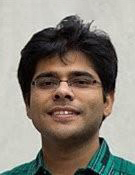
Events

Events
Title:Underwater Robotics at Various Size Scales
Time:14:00 to 15:00, Dec.24, 2019
Place:F310, School of Mechanical Engineering
Host:WEI Xiangzhi, Assistant Professor (Institute of Intelligent Manufacturing and Information Engineering)
Speaker:Assoc. Prof. Atul Thakur (Indian Institute of Technology Patna)
Biography
Atul Thakur is an Associate Professor in the Department of Mechanical Engineering at Indian Institute of Technology  Patna. His research interest is broadly in the area of robotics and automation. He has been actively engaged in the research involving the design, motion planning, and control of bio-inspired robots, application of robotics in the area of solid waste management, and selective micromanipulation of biological cells using magnetic microrobots.
Patna. His research interest is broadly in the area of robotics and automation. He has been actively engaged in the research involving the design, motion planning, and control of bio-inspired robots, application of robotics in the area of solid waste management, and selective micromanipulation of biological cells using magnetic microrobots.
He received a Ph.D. degree in mechanical engineering from the University of Maryland, College Park, Master of Technology (M.Tech.) degree in manufacturing engineering from the Indian Institute of Technology Bombay, and Bachelor of Engineering (B.E.) degree in production engineering from the University of Mumbai. Atul is a recipient of the 2013 Best Dissertation Award from ASME – CIE Division. He received Elsevier Journal of Computer-Aided Design 2012 most cited paper award. He is also a member of the American Society of Mechanical Engineers (ASME) since 2009 and Institute of Electrical and Electronics Engineers (IEEE) since 2011.
Abstract
More than 70% of the earth’s surface and 50-75% of human body comprises of water. Most of the water on the earth's surface is that of vastly unexplored oceans and comprises of different natural resources like petroleum and minerals and a plethora of organisms. The water inside the human body is the primary carrier of electrolytes, nutrients, and other vital substances. Underwater robotics is considered to play a significant role in exploring the oceans for harnessing natural resources as well as fluids inside the human body for minimally invasive detection and treatment of diseases. The aforementioned underwater environments comprise of currents, waves, drag, and obstacles which make the problem of imparting autonomy to the underwater robots challenging. This talk will present the challenges and opportunities in the area of underwater robotics at various size scales. In particular, the talk will present the recent results from our research group at IIT Patna in the area of unmanned surface vehicles (USVs), anguilliform-inspired underwater robotics, and magnetic micromanipulation of biological cells.

Shanghai Jiao Tong University
Address: 800 Dongchuan Road, Shanghai
200240